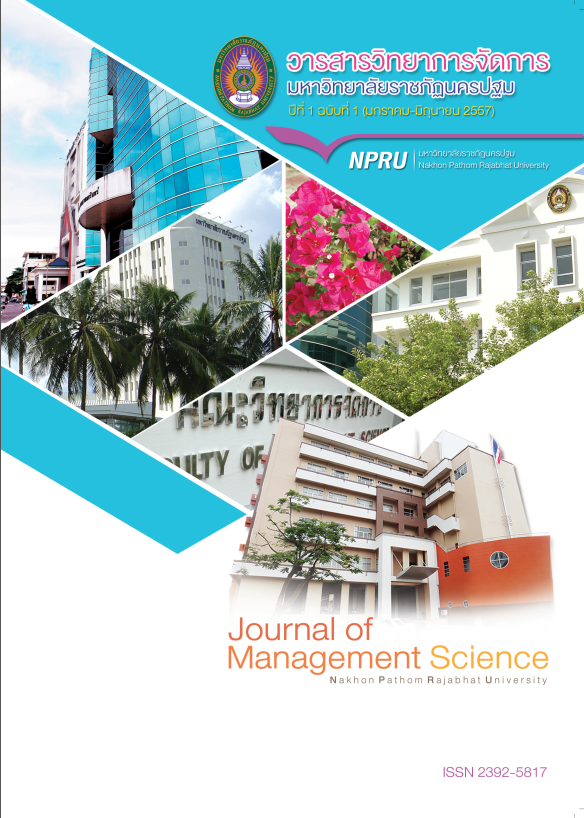Sustainable Organization from Philosophy of Sufficiency Economy and Total Quality Management
Main Article Content
Abstract
The objective of this thesis research study was (1) to studied the levels of Total Quality Management and Philosophy of Sufficiency Economy that leaded to Sustainable Organization (2) to created and developed the index of Sustainable Organization. This thesis Quantitative research studied was obtained
information data from executive and officer of Charoen Pokphand group Company Limited, in the total amount of 300 persons. The assessment tools comprised of general information questionnaire and Specific data questionnaire about policy, plan, organization administration structure and the view of opinion
Sustainable Organization, through this Specific data Summated Rating Scales questionnaire was pasted the tested for validity and reliability.
The result of the studied revealed Total Quality Management was significantly directed received influence from Philosophy of Sufficiency Economy ( = 0.88). While Sustainable Organization received influence from Philosophy of Sufficiency Economy ( = 0.79) and Total Quality Management ( = 0.43) consecutively. Every linear correlation line had statistic significant received influence in the confirm base composition analysis of conceal variable of Philosophy of Sufficiency Economy which cause from observed variables of Charoen Pokphand group Company Limited showed the derived from Enough ( = 0.50), Reasonable ( = 0.50) Knowledge ( = 0.39) and Moral ( = 0.37).
The confirm base composition analysis of conceal variable of Total Quality Management which caused from observed variables of Charoen Pokphand group Company Limited showed derived from the Quality Improvement ( = 0.55) Quality Control ( = 0.54) Quality Audit ( = 0.51) Quality Control ( = 0.48) Quality Procedures ( = 0.42). The confirm base composition analysis of conceal variable of Sustainable Organization which caused from observed variables of Charoen Pokphand group Company Limited showed derived from surrounding factors ( = 0.51) social ( = 0.49) economic ( = 0.48).
Article history : Accepted 2 May 2014
SIMILARITY INDEX = 2.40
Article Details
The views and opinions of the article appearing in this journal are those of the author. It is not considered a view and responsibility of the editorial staff.
References
กฤตินี ณัฏฐวุฒิสิทธิ์. (2554). ปรัชญาเศรษฐกิจพอเพียงในภาคธุรกิจ. เอกสารวิชาการศูนย์ศึกษาเศรษฐกิจพอเพียง : สถาบันบัณฑิตพัฒนบริหารศาสตร์.
ณดา จันทร์สม. (2554). เศรษฐกิจพอเพียงกับการปฏิรูปธุรกิจ” เอกสารวิชาการในโครงการ “การพัฒนาองค์ความรู้และเครื่องมือเพื่อการพัฒนาที่สมดุลยั่งยืน ระยะที่ 2. ศูนย์ศึกษาเศรษฐกิจพอเพียง: สถาบันบัณฑิตพัฒนบริหารศาสตร์.
ตลาดหลักทรัพย์แห่งประเทศไทย. (2556). ผลประกอบการเจริญโภคฑัณฑ์อาหาร. ค้นวันที่ 30 สิงหาคม 2556. จาก https://www.set.or.th/set/companyprofile.do?symbol=CPF&language=th&country=TH.
ธนาคารแห่งประเทศไทย. (2556). ผลการดำเนินงานของระบบธนาคาร พาณิชย์สำหรับปี 2556 ฉบับที่ 6/2556. ข่าวธนาคารแห่งประเทศไทย สำนักสื่อสารสัมพันธ์ฝ่ายสนับสนุนการบริหาร. ค้นวันที่ 18 สิงหาคม 2556. จาก https://www.bot.or.th.
เมธา สุวรรณสาร. (2540).การจัดระบบควบคุมความเสี่ยงของสถาบันการเงิน. ขอนแก่น : โรงพิมพ์คลังนานวิทยา.
สิทธิเดช นิลสัมฤทธิ์ และ มนตรี เกิดมีมูล. (2550). รายงานการวิจัยการดำเนินชีวิตในระบบเศรษฐกิจพอเพียงของประชาชนในเขตพื้นที่องค์การบริหารส่วนตำบล. กรุงเทพมหานคร : สำนักวิจัยสถาบันบัณฑิตพัฒนบริหารศาสตร์.
สุภมาส อังศุโชติ, สมถวิล วิจิตวรรณา และรัชนีกูล ภิญโญภานุวัฒน์. (2551). สถิติวิเคราะห์สำหรับการวิจัยทางสังคมศาสตร์และพฤติกรรมศาสตร์ .กรุงเทพมหานคร : มิชชั่น มีเดีย.
Yamane, T. (1973). Statistic : An Introductory Analysis. 3rd Ed. New York : Harper and Row.


